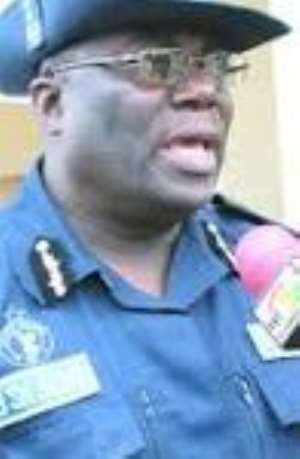
By Helena Selby
Mr. Paul Tawiah Quaye, IGP
Cache Arms
The Head of Small Arms Division at the Police Headquarters in Accra, Chief Superintendent Aboagye Yeboah, has hinted The Chronicle that his outfit would soon embark on an exercise to randomly search all individuals suspected of owning small firearms in the country. The decision, according to him, is to control the proliferation of small arms in the country.
Aboagye Yeboah further told The Chronicle that in collaboration with the Small Arms Commission they (police) had done a lot to ensure that such weapons did not get into the wrong hands, and that the random search was meant to complement the measures they had already put in place.
Chief Superintendent Aboagye Yeboah, who was speaking in a telephone interview with The Chronicle yesterday, said the police had seen to the formation of blacksmith associations across the country to help the former in fighting against the crime.
He, however, warned that being a member of the blacksmith association does not give one the license to engage in the manufacture of small arms. He cautioned that any blacksmith caught engaged in the manufacture of illegal weapons would be dealt with according to law.
The police boss could not give the exact number of illegal small arms in private hands, but emphasised that his outfit was keenly watching those who had officially registered such arms with the police.
The Acting General Executive Secretary of the National Commission on Small Arms and Light Weapons (SALW), Jones B. Applerh, alleged in a recent meeting with journalists at Sogakofe in the Volta Region that of the 80% locally manufactured small arms, only 95,000, representing 43.2%, were registered, leaving a significant 56.8% or 125,000 illicit guns in circulation in Ghana.
Speaking on the theme, 'Proliferation of small arms: a red flag to our development,' he noted that the Ministry for the Interior, which is mandated to register and license arms, in spite of the law pays no attention as to where and what arms are used for in the country, adding that the nation's law does not take care of brokers' activities.
He indicated that the ministry had as well refused to provide the necessary checks to monitor individuals who obtain these guns and recklessly expose them in the public domain.
He blamed the bad security system on the various borders as one of the causes of frequent arms flow in the country, citing La Cote d'Ivoire as one of the weakest border entry points, with just a pillar indicating the border line.
Stating some isolated incidents of gun violence in the past, he mentioned places like Chereponi, Atiwa, Bekwai, Techiman, Offinso, and prolonged violence in the Odododiodioo constituency.
He noted that the use of small arms had the tendency of preventing prospective voters from registering. Moreover, small arms may be used to vent anger on political opponents, and may be used to disrupt political campaigns and settle political scores.
The Acting General Secretary suggested the development of programmes to combat and eradicate the illicit trade in small arms, and education and sensitise the public on the dangers associated with the use of small arms.
The Executive Secretary of the National Media Commission (NMC), Mr. George Sarpong, on his part, mentioned that there was the need for the government to control the activities of arms brokers' in the country, by ensuring that the Ministry for the Interior does its work effectively.
He noted that effective border controls are vital in the fight against trafficking, but depend on the skills and capacities of agencies such as border guards, and cooperation with the police and neighbouring countries
He indicated that governments are responsible for restricting the availability of SALW within their own countries, so that only responsible users can obtain weapons, and that there should be detailed and comprehensive laws stating who may have weapons, what types of weapons are permitted, and for what reasons. Moreover, there should also be clear penalties, strong registration, and police capacity to implement the laws, he added.
Reviewing the Economic Community of West African States (ECOWAS) Convention on small arms and light weapons, their ammunitions and other related materials, the Head of the ECOWAS Small Arms, Dr. Cyriaque Agneketjhom, pointed out that member states were expected to ban the transfer of SALW into and from/through their territories.
According to him, member states, without exception, ought to ban the transfers of SALW to non-state actors that are not authorised by the importing state.




 SSNIT must be managed without gov’t interference – Austin Gamey
SSNIT must be managed without gov’t interference – Austin Gamey
 Ejisu by-election could go either way between NPP and independent candidate — Gl...
Ejisu by-election could go either way between NPP and independent candidate — Gl...
 We never asked ministers, DCEs to bring NPP apparatchiks for returning officer r...
We never asked ministers, DCEs to bring NPP apparatchiks for returning officer r...
 No one denigrated the commission when you appointed NDC sympathizers during your...
No one denigrated the commission when you appointed NDC sympathizers during your...
 Used cloth dealers protests over delayed Kumasi Central Market project
Used cloth dealers protests over delayed Kumasi Central Market project
 A/R: Kwadaso onion market traders refuse to relocate to new site
A/R: Kwadaso onion market traders refuse to relocate to new site
 Dumsor: Corn mill operators at Kaneshie market face financial crisis
Dumsor: Corn mill operators at Kaneshie market face financial crisis
 Jamestown fishermen seek support over destruction of canoes by Tuesday's heavy d...
Jamestown fishermen seek support over destruction of canoes by Tuesday's heavy d...
 Election 2024: EC to commence voter registration exercise on May 7
Election 2024: EC to commence voter registration exercise on May 7
 Public schools rebranding: We’re switching to blue and white, we’re painting all...
Public schools rebranding: We’re switching to blue and white, we’re painting all...
